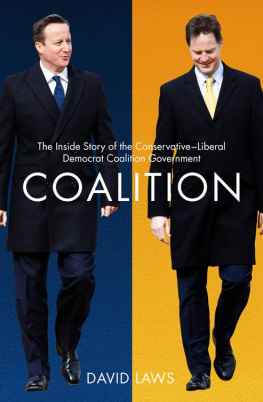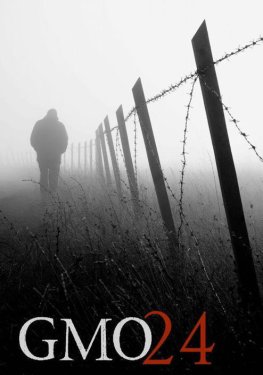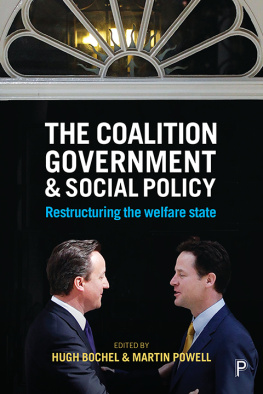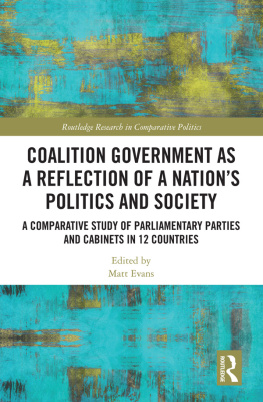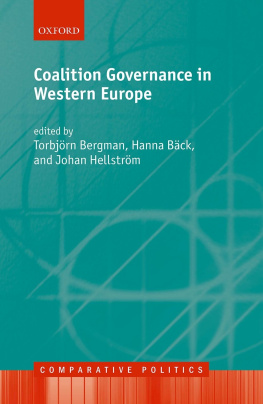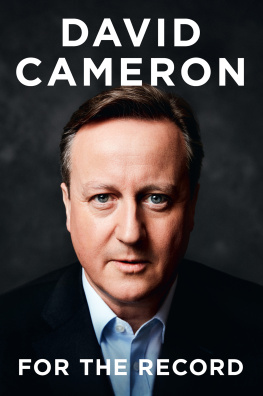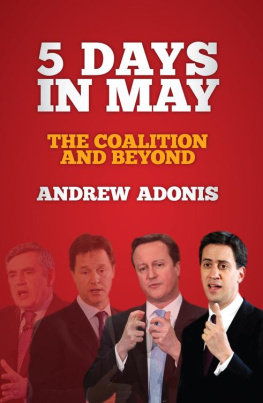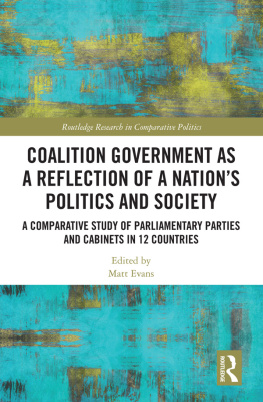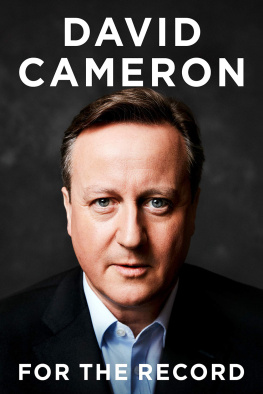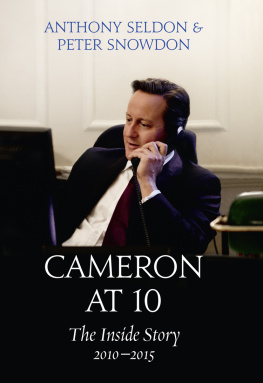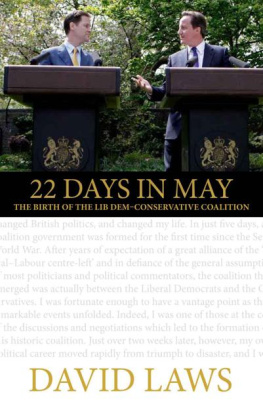I am extremely grateful to all those who have assisted me in writing this book over the nine months since the May 2015 general election.
I would particularly like to thank Nick Clegg, who kindly allowed me to access some of his own private papers and records to check facts. Thanks, too, to Phil Reilly, whose hard work made these records more accessible and easier to navigate.
I would also like to thank others who gave their time and advice, including Danny Alexander, Tim Colbourne, Ed Davey, Will de Peyer, Lynne Featherstone, Olly Grender, Stephen Lotinga, James McGrory, Christian Moon, Jonny Oates, Matt Sanders, Chris Saunders and Katie Waring. Of course, all errors, omissions and opinions are my responsibility alone.
I would like to record my sincere thanks to the brilliant Claire Margetts, whose hard work over the past four years has helped me to keep my own detailed accounts of the period of coalition government. It would have been very difficult to write this account without drawing on those records.
The extraordinary opportunity I had in government to observe and to participate in the events which are described in this book would not have been possible without the support of many people in my constituency and beyond. I will always be grateful to the kind, generous and supportive people of Yeovil constituency, who returned me as their Member of Parliament from 2001 to 2015. Being MP for the Yeovil constituency was the greatest privilege of my life, and I look back only with pride and pleasure on my time in that role.
I am extremely grateful to my superb Yeovil office staff of Sue Weeks, Claire Margetts, Sarah Frapple, Sadye McLean and all our loyal volunteers. Thanks also to Alec Newton and to all those who worked so hard in my office in London over the past fourteen years. I am grateful to Theo Whitaker, Graham Westrop, Khloe Obazee, and all those who gave their time during the 2015 general election campaign. Cathy Bakewell and Sam Crabb were my election agents during four general elections in Yeovil; their patience, dedication and wisdom are much appreciated and were critical to our success.
The early part of the 2010 parliament was a very difficult time for me personally, and I would not have remained an MP or returned to government without the marvellous and unconditional support of Olly Grender, Cathy Bakewell, Joan Raikes, Paddy and Jane Ashdown, Nick Clegg, Sam Crabb, the late and wonderful Pauline Booth, Jo and Martin Roundell Greene, John Dyke and of course James and my mother. To these few people, and to the many others not named here, I will always be particularly grateful.
Working in the coalition government was a fantastic opportunity to put principles into practice. I was supported impressively by my civil service private office teams, whose dedication and professionalism made me conscious of how much we should appreciate our civil service and its fine traditions of political impartiality and high standards. I enjoyed working with Sir Jeremy Heywood and his team in the Cabinet Office, as well as the Permanent Secretary at the Department for Education, Chris Wormald, and his colleagues.
In the Cabinet Office, I had the pleasure to work with Jonathan Crisp, Nick Donlevy, Katie Harrison, Suzanne Kochanowski and Natalie Perera, who staffed my private office for varying periods. In the Department for Education, my excellent and utterly dedicated team was variously composed of Wilhelmina Blankson, Lydia Bradley, Philip Cattle, Samuel Cook, Laura De Silva, Tom Dyer, Becci Fagan, Camilla Frappell, Samuel Kelly, the formidable Georgina Manley and Ursula Ritz (who both brilliantly managed my packed diary by frightening me and many others into keeping to time) and Daniel Sellman. My four irreplaceable policy advisers were Tim Leunig, Chris Paterson, Matt Sanders and Julian Astle. They contributed hugely to all we achieved and prevented me from making many errors.
I am also grateful to the dedicated policy team based in the Deputy Prime Ministers Office, who gave both Nick and me high-quality and rigorous advice.
In this book, I describe in detail my working relationships with senior colleagues in the coalition government. All relationships have their good and bad patches. In fact, the moments of tension and difficulty were relatively rare, and it was a great pleasure and honour to work with most of those referred to in these pages.
If there are few real villains in my account, it is because in my experience most politicians in all of the political parties are decent, hard-working people. So, my particular thanks to those in both coalition parties whom I worked most closely with: Danny Alexander, Vince Cable, Nick Clegg, Nick Gibb, Michael Gove, Jonathan Hill, Jeremy Hunt, Norman Lamb, Oliver Letwin, Nicky Morgan, John Nash, George Osborne and Liz Truss. And my apologies for anything you find in here which you would rather had stayed secret!
Finally, I am grateful to the team at Biteback Publishing for their work on this volume, and in particular to the patient and extremely efficient Olivia Beattie, and the irrepressible Iain Dale, who encouraged me to tell the tale that follows.
D AVID L AWS
Kennington
January 2016
T his is the inside story of the Liberal DemocratConservative coalition government of 201015. It is the first detailed and extensive account by one of those who served in this government.
I was one of a small number of MPs and advisers who helped negotiate the coalition between the Liberal Democrats and Conservatives in May 2010. I attended the first Cabinet meeting, on Thursday 13 May 2010, and I was there at the last Cabinet meeting, at 9.45 a.m. on Tuesday 24 March 2015. Only fifteen other ministers were present on both occasions.
In writing this account, I have drawn on my own records of my time in government. I have also been able to access some of the records and recollections of my close colleagues. This has allowed me to produce a detailed account of the government and its work.
Where I put conversations in quotation marks, it is generally because I was present to hear exactly what was said. Where I was not present, I have usually sought to summarise the reported conversations, unless I have highly reliable accounts of particular exchanges to draw on. Of course, in both cases it is impossible to vouch for every word spoken, but I am confident that I have provided a fair and accurate account.
In telling the story of the coalition, I have sought to be as open and revealing as possible. But I have obviously had to respect the rules about the privacy of certain government information, not least where national security is concerned. I have also had to weigh carefully where revealing sensitive information about individuals, or repeating conversations held in the expectation of privacy, might be considered unreasonable or discourteous. I have held back much from my account which might fall into these categories but generally only where these details are not fundamentally important to the story I am telling.
I do not, however, pretend that this account is exhaustive or that it allocates to each area of the governments work a fair, measured and proportionate amount of space. Inevitably, this book reflects my own sense of what was important in the governments work and the areas that I was involved in. However, the roles I held in government Chief Secretary to the Treasury, Minister of State in the Cabinet Office, and Minister of State for Schools gave me a very good vantage point to assess the most important areas of the coalitions work.
It must also be understood that as a Liberal Democrat member of the government, I was in a better place to view the internal workings of the Liberal Democrat side of the coalition, and my account draws very much on this particular perspective.

